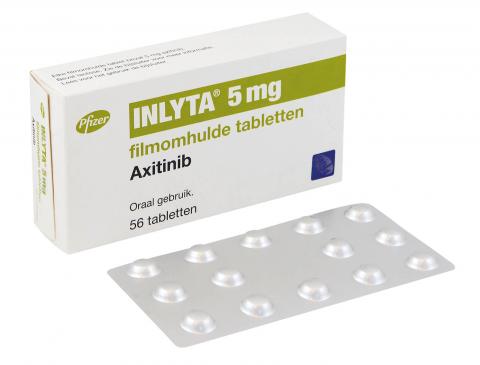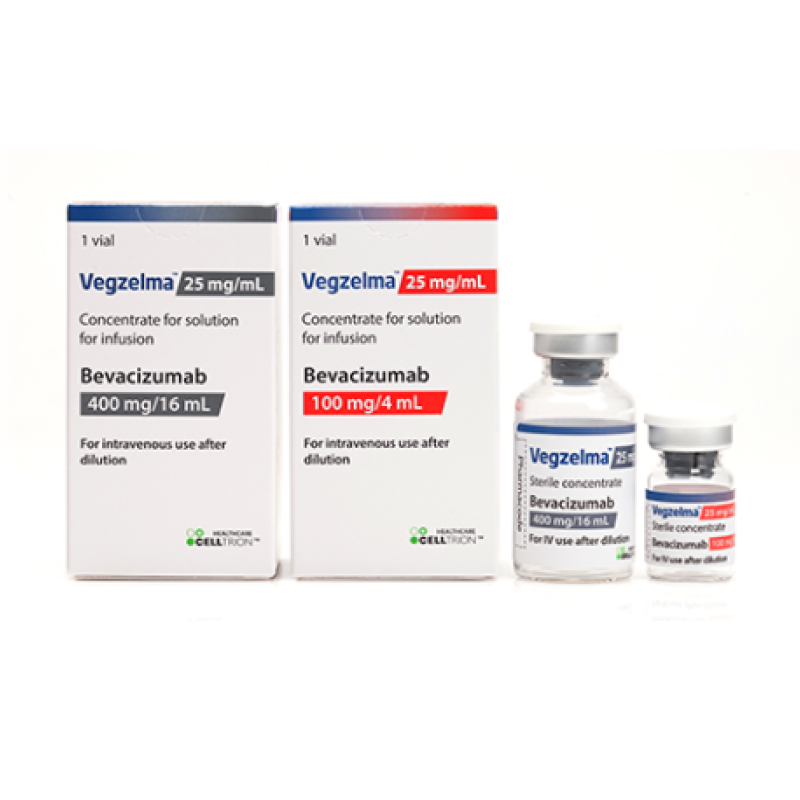Inlyta (axitinib) vs Vegzelma (bevacizumab-adcd)
Inlyta (axitinib) vs Vegzelma (bevacizumab-adcd)
Inlyta (axitinib) is a tyrosine kinase inhibitor specifically designed to target and inhibit the vascular endothelial growth factor receptors (VEGFRs), which play a role in tumor growth and angiogenesis, making it an effective treatment for advanced renal cell carcinoma (kidney cancer). Vegzelma (bevacizumab-adcd) is a biosimilar to the original bevacizumab (Avastin) and works by binding to the vascular endothelial growth factor (VEGF) itself, thereby inhibiting the interaction with its receptors, and is used to treat various types of cancers, including colorectal, lung, glioblastoma, and renal cell carcinoma. When deciding between the two, it's important to consider the specific type of cancer, the stage of the disease, the patient's overall health and previous treatments, as well as the side effect profiles and the mode of administration, as Inlyta is taken orally while Vegzelma is administered intravenously.
Difference between Inlyta and Vegzelma
| Metric | Inlyta (axitinib) | Vegzelma (bevacizumab-adcd) |
|---|---|---|
| Generic name | Axitinib | Bevacizumab-adcd |
| Indications | Advanced renal cell carcinoma after failure of one prior systemic therapy | Metastatic colorectal cancer, non-small cell lung cancer, glioblastoma, renal cell carcinoma, cervical cancer |
| Mechanism of action | Tyrosine kinase inhibitor | Monoclonal antibody that inhibits angiogenesis by binding to vascular endothelial growth factor (VEGF) |
| Brand names | Inlyta | Vegzelma |
| Administrative route | Oral | Intravenous |
| Side effects | Hypertension, diarrhea, fatigue, decreased appetite, nausea, dysphonia, hand-foot syndrome, weight decreased, vomiting, constipation | Epistaxis, headache, hypertension, rhinitis, proteinuria, taste alteration, dry skin, rectal hemorrhage, lacrimation disorder, back pain |
| Contraindications | Hypersensitivity to axitinib, severe hepatic impairment | Hypersensitivity to bevacizumab or any of its excipients, uncontrolled hypertension, surgery and wound healing complications |
| Drug class | Tyrosine kinase inhibitor | Monoclonal antibody |
| Manufacturer | Pfizer | Celltrion Healthcare Co., Ltd. |
Efficacy
Efficacy of Inlyta (Axitinib) for Kidney Cancer
Inlyta (axitinib) is a prescription medication specifically indicated for the treatment of advanced renal cell carcinoma (RCC), which is the most common type of kidney cancer in adults. Axitinib functions as a tyrosine kinase inhibitor, which works by blocking certain proteins that promote the growth of cancer cells. Clinical trials have demonstrated the efficacy of axitinib in prolonging progression-free survival in patients with advanced RCC, particularly after failure of one prior systemic therapy. In a Phase III trial, patients treated with axitinib had a median progression-free survival of 6.7 months compared to 4.7 months for those receiving sorafenib, another targeted therapy.
The approval of Inlyta was based on the results of these clinical trials, which showed a significant delay in tumor progression. However, it is important to note that while axitinib has been shown to be effective in slowing the progression of advanced RCC, it is not a cure for kidney cancer. The response to axitinib can vary among individuals, and the treatment may be associated with a range of side effects that need to be managed under the care of a healthcare professional.
Efficacy of Vegzelma (Bevacizumab-adcd) for Kidney Cancer
Vegzelma (bevacizumab-adcd) is a biosimilar to the original bevacizumab product, which is a monoclonal antibody that targets vascular endothelial growth factor (VEGF). By inhibiting VEGF, bevacizumab can decrease the blood supply to tumors, which is essential for their growth and survival. Bevacizumab, in combination with interferon alfa, has been approved for the treatment of metastatic renal cell carcinoma based on the results of clinical trials showing improved efficacy over interferon alfa alone.
The efficacy of bevacizumab in kidney cancer was established through pivotal studies where it demonstrated an increase in progression-free survival. For instance, in a randomized, double-blind, phase III study, patients with metastatic RCC who received bevacizumab in combination with interferon alfa had a median progression-free survival of 10.2 months, compared to 5.4 months for those who received interferon alfa alone. While Vegzelma, as a biosimilar, is designed to have no clinically meaningful differences from the reference product bevacizumab, its efficacy and safety in the treatment of kidney cancer are expected to be similar to those of the original product, based on the totality of the evidence from analytical, preclinical, and clinical studies.
Regulatory Agency Approvals
Inlyta
-
European Medical Agency (EMA), European Union

-
Food and Drug Administration (FDA), USA

Vegzelma
-
European Medical Agency (EMA), European Union

-
Food and Drug Administration (FDA), USA

Access Inlyta or Vegzelma today
If Inlyta or Vegzelma are not approved or available in your country (e.g. due to supply issues), you can access them via Everyone.org.
How it works

Make an enquiry
Choose the medicine you want to buy, answer a couple of questions, and upload your prescription to speed things up. We’ll get back to you within 24 hours.


Make an enquiry
Choose the medicine you want to buy, answer a couple of questions, and upload your prescription to speed things up. We’ll get back to you within 24 hours.


Breeze through the paperwork
We'll guide you through the required documents for importing unapproved medicine, ensuring you have all the necessary information.


Get a personalized quote
We’ll prepare a quote for you, including medicine costs and any shipping, administrative, or import fees that may apply.


Receive your medicine
Accept the quote and we’ll handle the rest - sourcing and safely delivering your medicine.

Some text on this page has been automatically generated. Speak to your physician before you start a new treatment or medication.
Let's talk
If you have any questions, call us or send us a message through WhatsApp or email:
Contact us




